THE COLLAPSE OF THE LEGITIMISTS.
THE sudden, the almost melodramatic collapse of the Legi- timist party in France appears to have been due to three causes. Their dignified but feeble chief at the last moment has preferred his honour, or rather his own notion of his honour, to his ambition ; their managers have overrated ex-. ceedingly the influence of the Ultramontane idea over the peasantry ; and their rank and file, suddenly brought to the front, shaken as it were out of slumber by the earthquake of '70, have in their new contact with the business of daily life become practical politicians. The Comte de Chambord, as we endea- voured a few weeks since to show on the evidence of his letters, is before all things Royalist, a man originally of thin capacity; whose mind has been tranquillized, and in one way elevated, by an idea which has to him all the binding force of a creed. He is King de jure in his own thought, King both by the grace of God and as " heir of the traditional monarchy of France," and though he can concede anything in the way of constitutions, or promises to accept advice, he cannot surrender what he believes to be the symbol and expression of his right. He appears, after long discussions with the political managers of his party, and with representatives of the Orleans Princes, to have been driven from point to point, to have surrendered the peerage—he did that in a letter of some weeks ago,—to have abandoned the Temporal Power,—he does that implicitly in both his latest manifestoes,—and even to have acknowledged after some indistinct fashion the expediency, if not the right of uni- versal suffrage,—he does that in his valedictory letter ; but these immense concessions onlyincressed the tenacity with which
he clung to minor points and more especially to the White Flag as the symbol of " the traditional throne " he claims. To
surrender that seemed to him to surrender honour, the" sanctity," as Bishops and Legitimists think it, of his position, the concrete symbol which, like the Papal keys, had for centuries embodied the whole meaning of his claim. When asked therefore to give up this ensign, he refused, and in refusing refused also to ascend the throne. One-half even of his own party were not prepared to abolish the tricolour, which has, as Lamartine said, made the tour of Europe, and is interwoven with the greatest victories of France, while to the groat majority of Frenchmen such an act would have appeared like an effort to cancel history, an intentional breach with the whole spirit of the modern world. The Orleans Princes, moreover, seem to have made the tricolour a condition of the fusion, and to the Army no other flag could have been either acceptable or honourable. To remove it was to break with allies absolutely required to re- establish the throne, but to retain it seemed to the narrow but resolute mind of the Count to break with the tradition which makes him, to insult his own right, to for- swear the faith which is to him a creed. Placed between his conscience and his policy, he obeyed the former, and absurdly misguided as we think his conscience to have been, we have still some respect for the Prince who preferred a conviction, however narrow, to a throne, however groat. Nothing loss statesmanlike or more honourable than his valedictory pro- clamation has appeared in our time, and nothing, we may add, which has produced on its author's fortunes so disastrous an -effect.
The tenacity of conviction and narrowness of view dis- played by the Count would, of itself, have destroyed his • chances, for a quarrel about a flag is just the kind of quarrel in which a nation must beat a Than ; but two other causes have helped to disintegrate his party. One, it seems clear, was the alliance with the Church attributed to them by opinion. We do not believe that this alliance was as strongly cemented as Ultramontanes would fain believe. The House of Bourbon, though capable of dragonnades, has never been .subservient to the Pope. Kings are rarely missionaries ; the Comte de Chambord showed symptoms in his letters of liking Bishops as Disraeli's Duchess of Bellamont did, " in their places ; " some of the greatest Legitimists are Voltairians ; and at the first sign of genuine pressure the chiefs of the party flung St. Peter overboard. The promise to restore the Temporal Power was dropped as by consent. But the management of the fusion had been entrusted to Bishops, the Vatican, with the want of statecraft it has persistently dis- played of late years, expressed its hopes very loudly, and the Clericals went about crowing over the coming providence with enthusiastic indiscretion. The peasantry, it is affirmed, took it into their heads that a restoration meant a now war which would involve the Southern provinces, but that suggestion is not at all necessary to explain their action. French peasants are very apt to consult the cure, and to take his advice whenever it is not clear that the advice is given in the interests of his order. When it is, as, for example, in every question whatever involving the pecuniary interest of the Church, they are as silently suspicious, as respectfully dis- obedient towards the cure as towards every other man a little above themselves. The ballot conceals their votes, the clerical candidates, therefore, whose chances had seemed so good were everywhere defeated, and their defeat was a defeat also for the party believed to be their allies. Judging by the elections, it is more than probable that the favour of the Church heavily weighted the Legitimists, disinclining the departments to vote for them, and changing the dislike of the great towns into an active antagonism. Men who hate priests hate hard. There is no necessary connection that we know of between the Gallican House of Bourbon and Ultramontanism, but in the popular belief they were united, and they were defeated together. The peasants were very religious on points, but as the Popo was still in Rome, and the machine of .salvation still in motion, they saw no necessity for electing the curds' friends.
And finally, it seems clear that a new spirit has been 'developed in the Legitimist party itself. Frenchmen who stand very close to the centre of things testify that the instinct of patriotism is stronger in this party than any other in France, that it is more alarmed by the disasters of the -country, more ready to make considerable sacrifices on its behalf. No party rose in arms so readily in 1870, and none .appears to have gained so much education from the struggle. It has abandoned altogether its sleepily dignified policy of abstention. Counts by the dozen were at Gambetta's disposal. " Nine dukes in a row took part in the first seance of the Assembly at Versailles, and at least one-third of the whole House belongs to the class which for nine-and-thirty years has held almost aloof from politics. That of itself is a great change, but it is not so great as the change which appears to have passed over the tone of the men who have come forward. They have become by comparison practical politicians. Instead. of at once proclaiming the Monarchy, as a kind of Church not to be held in abeyance for an hour without sin, they supported the interregnum intended to give the Republic time. Instead of voting declarations such as Berryer would have proposed, their first independent act was to vote, by a majority of three-fourths, a Bill for " decentralization," that is, a Bill enabling the Councils-General to restrain the prefects. Instead of demand- ing troops for the reoccupation of Rome, they sent a corps to put down the insurrection in Algeria. And now that their cause is loot, for the present, at any rate, now that their King has shown that he also is under the Bourbon spell—the destiny which forbids the family ever to be wise in time—one half of the party is pronouncing for the " pure " Republic as the only reasonable alternative. It was natural that this should be their resort. They cannot under the code of consistency, by which Frenchmen paralyze their political efficiency, obey any individual pretender except Henry Cinq ; but they can obey France, and as they do not wish to recommence the old infructuous and self-destructive career of abstention, they must, failing the Bourbon, render their support to the Republic. And it is more than probable that their Republic will be rather of the Gambetta than of the Thiers type. Personal prejudice is certain to lead them that way, for while they followed Gambetta, Thiers deserted monarchy, and the former has always exhibited a marked preference for their aid, a marked tolerance, as he said at Bordeaux, for the men who although by "exceptional social history forbidden to be
Republicans," may nevertheless be trusted by the Republic. Moreover, they wish, like other men, for importance ; they believe themselves, with some truth, to be free of the vicious greed to which they trace half the disasters of France, and no regime except that of the legitimate king can give them half the advantages offered by the one which M. Gambetta favours,
the rule of a Sovereign Assembly, in which any one may rise. Changes are too rapid in France for any one to predict any- thing, but nothing would surprise us less in the immediate future than an alliance between the Legitimists and the Left for the support of a Republic, of which M. Gambetta would be the ruling spirit. The prospect cannot be a pleasant one for M. Thiers, but the astute old .Parlia- mentarian has made coalitions before now, and has not belief enough in anything but himself to hate an opponent who will tolerate him.































 Previous page
Previous page